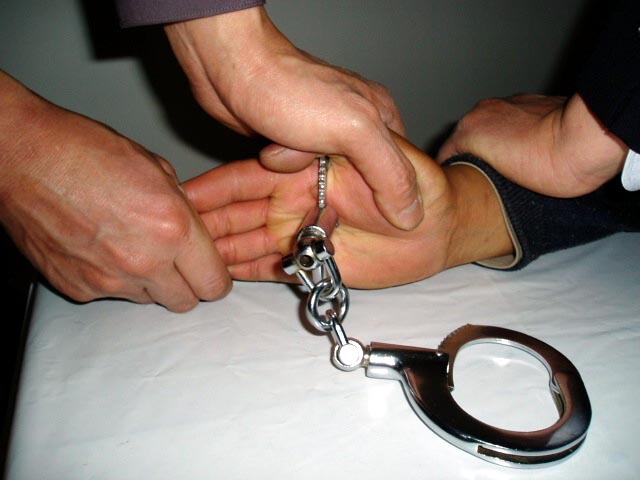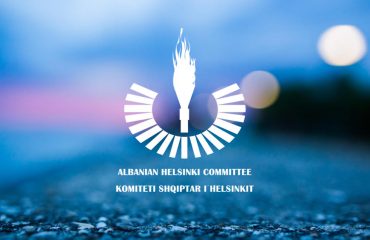In recent days, the Albanian Helsinki Committee (AHC) carried out two monitoring missions in the Prison Hospital (SIPS – Special Institution for Prisoner Services), Tirana and the Zaharia Prison, Kruja. The purpose of the monitoring missions was to observe on site respect for the rights of persons with mental health problems, placed in these institutions.
In the Prison Hospital (SIPS), the situation appears very disturbing. The capacity of the institution is for 99 persons while there were 112 persons accommodated there, which means 13 persons above the capacity. 92 persons suffer from mental health disorders, of which 34 persons have been remanded to “temporary hospitalization,” 54 have been remanded to “Compulsory medication,” and 4 persons are detainees who suffer from different diseases. Overcrowding in this institution was observed in several of its rooms, where there were up to 5 persons, with 1-2 persons sleeping on the floor, on foam mattresses. In one room of 14m² there were 7 persons, 3 of which on the ground with foam mattresses. It is worth mentioning that the foam mattresses and sheets in the rooms were misused and filthy.
The security measure “temporary hospitalization,” according to article 239 of the Criminal Procedure Code needs to be executed not in any health institution but in a psychiatric hospital. For persons that the court has remanded to “compulsory medication,” according to article 46 of the Criminal Code and article 28, item 1 and 2 of the Law no. 44/2012, “On mental health,” such a measure should be executed in special medical institutions, part of the integrated health care system of the Ministry of Health. In other words, 80% of persons accommodated in the Prison Hospital,[1] penitentiary institution, remain in them in flagrant violation of the law. For over two and a half decades, there is still no solution for this category of citizens. On the other hand, their stay in an institution such as the Prison Hospital overburdens this institution as part of the penitentiary system, whose health care personnel is of different specialties and, according to law, needs to treat only convicts and detainees suffering from various illnesses in all prisons in Albania. Part of this personnel is only one psychiatric doctor who, due to the overburden and the long years of experience, was soon to leave the SIPS.
Furthermore, the Committee for the Prevention of Torture (CPT), in its 2018 report on Albania stressed: “Gjithashtu, Komiteti për Parandalimin e Torturës (KPT), në raportin e vitit 2018 për Shqipërinë ka theksuar se: “if the Albanian authorities continue to fail to implement the long-standing recommendation set out in paragraph 32 that all forensic psychiatric patients be transferred to a forensic psychiatric facility, it will have no choice but to set in motion the procedure provided for in Article 10, paragraph 2, of the Convention.”
In general, the rooms we visited and the internal premises of the institution were clean and well-maintanied by the sanitary staff. However, we noticed that infrastructure conditions were very poor. Wear was very evident and physical conditions did not guarantee human treatment of these citizens. Very close to the windows, in the external premises of the building, we observed considerable collection of waste from the basement. In the absence of screens on the windows, this condition threatens the health of persons living in these rooms because mosquitoes and other insects were in abundance and, as a result, might cause infections.
Aside from 2 or 3 hours of airing exits, the persons were not offered any activity in the open or recreational, aside from medicating treatment. In violation of Law 44/2012, “On mental health” and standards of physical confinement set by the Ministry of Health, in October 2012, the administration applied physical confinement through tying the person to bed, in handcuffs. Health care personnel argued the use of this tool because the room and the physical conditions did not allow for the use of other means of physical confinement that avoid or minimize self-harm. It is worth mentioning that there was no Special Register to highlight such practices. Such actions are in contravention of article 3 of the European Convention for Human Rights, because they contain elements of inhuman and degrading treatment.
In the Zaharia Prison (Kruja), as in the past, AHC continues to find severe violation of the rights of persons placed in this institution. In fact, both the People’s Advocate and AHC have suggested the shutting down of this institution. The Committee for the Prevention of Torture also held the same stance. The capacity of this institution is for 180 persons while 230 persons are accommodated there now, i.e. 50 persons above its capacity. Overcrowding is even more disturbing than in the Prison Hospital, where there were 10 persons per room. Statistics highlight that 142 persons in this institution have been remanded to the medical measure of “compulsory medication” and 84 persons have been remanded to “temporary hospitalization.” In other words, 98% of the persons with mental health illnesses have been accommodated in the Zaharia Institution, part of the penitentiary system, in violation of the law.
Considering that the observed violations are recurring ones and have consequences, AHC suggests to the Ministry of Justice to intervene to improve the situation.
AHC also suggests to the Prosecution Office to initiate criminal proceedings, on its own initiative, for “inhuman and degrading treatment,” envisaged by article 86, letter d) of the Criminal Code.
It should also be stressed that the penal policy pursued by courts to decide on the measure of “temporary hospitalization” and “compulsory medication” remains a harsh one. AHC met citizens with mental health problems who were in the SIPS for months and had been accused of stealing items of little value such as “play station” or otheroffenses that do not pose particular social threats. Both the prosecution office in its requests and the courts, in enforcing criminal legislation, need to take into consideration that criminal legislation is permeated by the principle of humanism, particularly in circumstances when part of these persons do not pose any special social threat. Upon conclusion of the penal process, these citizens with mental health diseases are declared irresponsible mentally and, due to the low level of threat of their offenses, may be prosecuted through the outpatient service at home. Their stay in isolated premises such as the SIPS or the Zaharia Institution, in our judgment, does not help their medical rehabilitation but, to the contrary, these citizens were very agitated to stay in isolated premises.
These monitoring missions were conducted in the context of the initiative “Strategic litigation for effective protection of human rights in the health care field,” supported financially by the Open Society Foundation for Albania.




